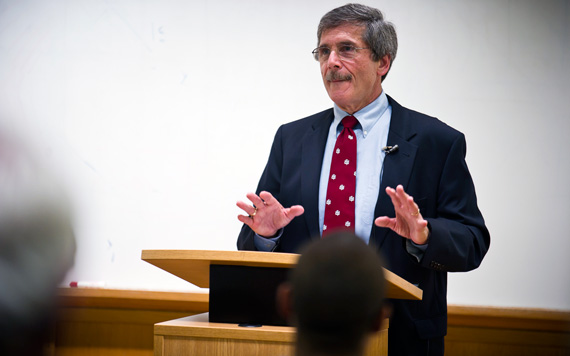“Progress — good, filibuster — bad, Senate — weird,” said Alan Frumin ’68, while reflecting on his political philosophy before moving to Washington, D.C., to begin his career after Colgate.
Working as parliamentarian of the United States Senate for nearly 20 years, Frumin operated behind the scenes and witnessed the many changes that shook the nation. Returning to campus Tuesday to deliver the first presentation in the newly established Edgar L. Shor Memorial Lecture series, Frumin’s dedication to serving as parliamentarian — the official advisor to the Senate on the interpretation of procedures and rules — was clear.
He shared some of the challenges he faced when advising the Senate amidst the ever-changing and often heated political climate.
“The Senate is a complex organization, for responsible adults only,” said Frumin. “Over its years, it has had a critical mass of responsible adults that understood that they were all armed with the enormous power to say ‘no,’ but unless they restrained themselves, nothing would ever be accomplished.”
During his career as parliamentarian, he was hired by both Republicans and Democrats, proving that his integrity and steadfast bipartisanship were clearly evident during many turbulent times in Washington.
Frumin was honored as parliamentarian emeritus after his retirement earlier this year. He worked 35 years in the Senate parliamentarian’s office, 18 of those as chief parliamentarian. He said that learning to listen was one of the invaluable lessons he brought from Colgate to Washington.
“[At Colgate] I learned humility, to respect every individual, and to restrain myself from drawing judgments,” he said. In Washington, he applied those ideals to his position, especially when he was brought into the media spotlight during the controversy over the Affordable Care Act — a bill that dominated the Senate floor for quite some time.
“The rules are silent [in the Senate] on limiting debate,” says Frumin. “That simple fact has governed the nature of this body since 1886.”
Senators, he explained, may not only answer “yes” or “no” but because of procedures like filibusters, they can firmly assert their opinion and answer “hell no,” and prevent bills from passing.
Frumin is currently penning the new Senate manual of procedures, which will act as parliamentary guidelines for many terms to come.
The lecture was sponsored by the Institute for Philosophy, Politics, and Economics.
